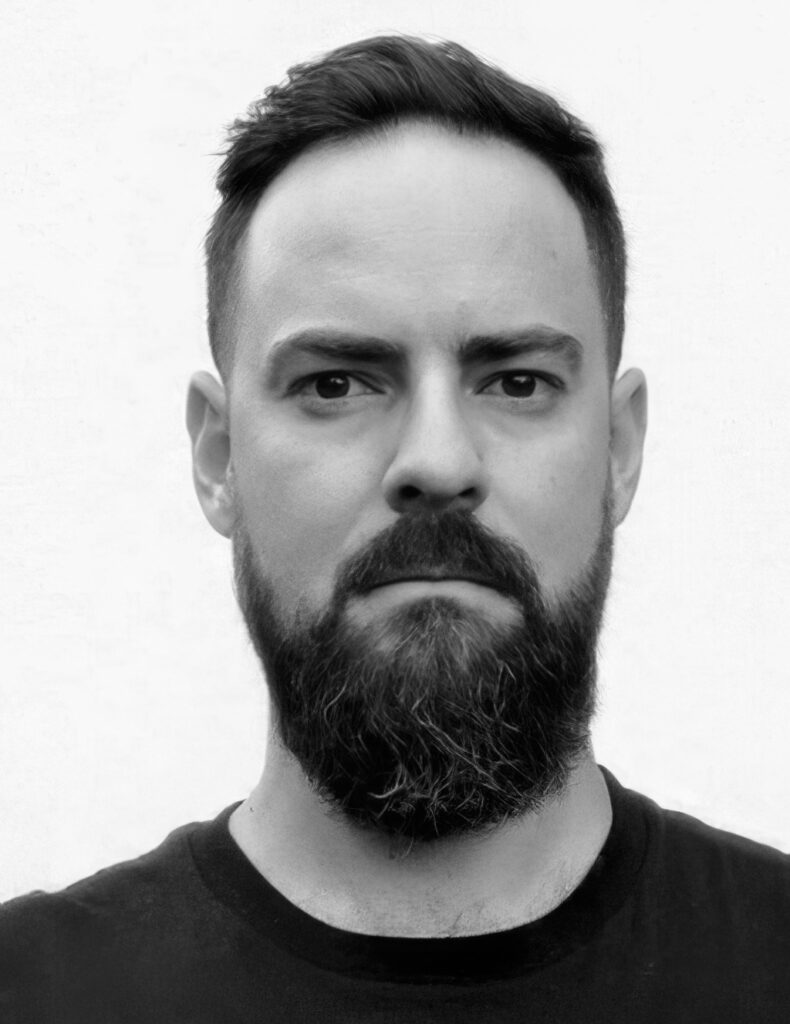
Deco Dawson is an international award-winning filmmaker from Winnipeg, Manitoba. His 15 innovative films remain, at times, unclassifiable, continually blurring the lines between dramatic, documentary, animation and experimental film, often creating fantastical worlds with miniatures, archival footage, meticulous set design, in-camera effects and grainy, textured filmstock.
When and how did you start in the media production industry?
I started in 1998 with my first short film EMEND. I made it while in a film class at university and it went on to screen around the world. I studied film early with Guy Maddin as a mentor and collaborator. In 2001, we made the feature film Dracula: Pages from a Virgin’s Diary, which was my first experience being on a “traditional” film set.
What area of the film industry do you work in now and why?
I work as a writer, director, producer, editor, cinematographer and in post-production visuals (vfx, colour correction and online). I find that I best fit under the banner of filmmaker more so than any one specific title. To be a successful filmmaker, you have to be knowledgeable about the entire process, the more you understand about post-production, the better a cinematographer you will be. The more informed you are about funding and budgets, the better a writer you will be. The more you understand about editing, the stronger a director you will be. The world of film production is extremely collaborative, but you need to be the maestro leading the concert, you don’t have to know how to play the bassoon, but if you know how it works, you can communicate with the musician to give constructive, informed feedback and get closer to what you want. You also need to make sure you can communicate with the audio recordist at the concert if you want to have it recorded and released the way you intend.
What has been a substantial change in the industry since you started?
I work on the periphery of the industry, which seems to power on like a steamship tugging through rough waters all the time. We now have more crews in Manitoba with more experience, and I have noticed various production spaces have opened up around town. It feels like people have been able to open smaller, specialized companies that would never have been possible to sustain previously.
If you could give yourself advice today to yourself in the past, what would it be?
Trust your instincts and never lean into people’s opinions about doing things differently if it doesn’t feel right. Everyone has an opinion, and no opinion is absolute, but take advice and go with your gut. As David Lynch once said, “always take a good idea and never take a bad one”.
What advice would you give to someone starting off in the media production industry?
I would suggest learning as much about the entire process as possible. The industry is vast, it can burn you out quickly. Finding a role in the industry that best suits your personality and interest in making films will keep you fresh and help you avoid the burn out. However, you have to be knowledgeable about the different facets to understand how best to pitch yourself to those in charge about taking on a new role. Often there is a deluge of productions at once and new, green talent is required for certain productions. Use this opportunity to work in a different department you may not have direct experience in but might be interested in doing, you will most likely be hired for your past experiences on set.
Why is learning and training important?
I think mentorship, on-the-job experience, and self-initiation are the most important first steps in becoming good at what you do. Oftentimes, training is the only way to actually cross that threshold and is vital to opening a door you might not otherwise walk through.
What are some of the films, TV series or even books that have inspired you? How about anything new you’ve been into?
One of my recent favourite films is Werner Herzog’s Stroszek, a film like no other. Also Valley Girl was a really great treat I didn’t expect. I love biographies on interesting filmmakers.
Having most recently read Rick Rubin’s The Creative Act: A Way of Being, I can attest to it being one of the best ever written on the topic of creativity.
Is there something about you or an interesting past experience that you’d like to share with your colleagues?
In 2022, I released my feature film DIASPORA, about a young Ukrainian immigrant moving to Selkirk Avenue. The film is in 25 different languages and is almost entirely cast with newcomers. This experience was incredible and one of the best of my life. For me, it was extremely important to give new immigrants to Manitoba the opportunity to act in a film. It was for many, up until that point, unfathomable to be in a movie.
I think it is important to acknowledge that, for many, movie-making is this magical thing that only privileged people do. I think we are at a fortunate time in our society when we are finally recognizing that diversity is something to support on screen. We are, for the first time in mainstream cinema and TV, hearing accents on screen, something that was terrifying to studios and distributors even a few years ago.
Is there someone within the film industry you would like to work with and why?
Yes, anyone that would like to work with me, especially if they are looking for a way to get back to the reasons they got into this industry in the first place. When it gets difficult, when it is industrialized, it is easy to forget that filmmaking is an art form. The path in the last twenty years has been towards producing content and my hope is to continually bridge the gap between film production and art, telling interesting stories, using the vocabulary of cinema, acting, set design to continually create the types of films that are inspiring to be on for the cast and crew and serve as a reminder as to why we got into movie making in the first place.
Where do you see yourself in ten years from now?
Penniless and at the bottom of a well.
FTM is a non-for-profit charity and member of the Province of Manitoba’s Sector Council program funded through the Economic Development, Investment, Trade and Natural Resources. FTM builds a highly skilled and adaptable film industry workforce to support the activities of Manitoba production companies. FTM collaborates and partners with members of the film industry to identify training needs to support workforce development.
